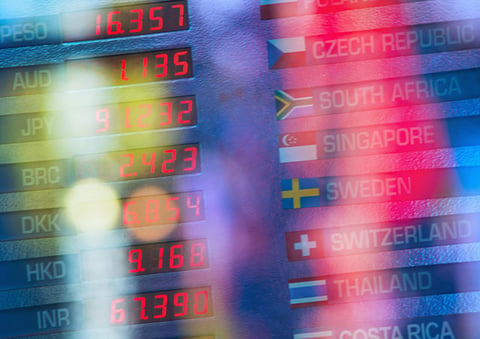Forex vs equities
A lack of awareness of the risks and rewards involved in forex trading has prevented it from becoming an alternative to investing in equities

Frank Mathias is a typical example of a retail equity investor in the UAE. The 53-year-old Indian holds a regular day job in tobacco sales. And on the sidelines, he plays on the UAE’s stock exchanges to make an extra buck or two when the markets present an opportunity.
He has seen the highs and the lows of the Dubai Financial Market (DFM) and the Abu Dhabi Security Exchange (ADX) indices in the past eight years since he has been investing in stocks. There were spells of hot money inflow, speculative investments and sharp spikes in stocks, which followed the incredibly long and dull periods of low liquidity when markets hardly stirred. But Mathias, like so many other retail investors, did not look to other asset classes, such as foreign currency trading, better known as forex trading, as an alternative to investments in stocks.
The prime reason for that is lack of awareness, says Wadah Al Taha, Chief Investment Officer at Dubai-based Zarooni Group. Forex trading is a fast-paced, complicated affair, and the whole idea is quite alien to majority of retail investors who account for more than 80 per cent of trade on the country’s stock exchanges, he notes.
Sufficient options
With markets now mirroring some of the good old days, there isn’t really a need to look for additional investment options, he maintains. ADX general index is up close to 40 per cent this year, while the DFM benchmark measure has advanced close to 50 per cent for the same period. Both the indices showed strong advances in 2012 as well and were among the top GCC performers.
Apart from a general lack of awareness about forex, its risks and rewards and how it is traded, Al Taha says there are doubts in the minds of investors in terms of credibility of some of the companies offering forex trading opportunities. Some of them would claim four or five times returns on the investments in quick time, which defy logic. Most such companies do not even exist here, a factor that makes investors hesitant. “The credibility question marks on these companies cast a negative shadow even on the companies that are genuinely offering good services and forex trading platforms,” Al Taha says.
In his opinion, the companies that do operate in the UAE should be better regulated, examples being the representative offices of some of the international brokerage firms situated outside the financial free zones of Dubai International Financial Centre (DIFC). It is also unclear who regulates them, Al Taha says.
To make investors more comfortable with the idea of forex trading, Al Taha suggests that regulators should consider allowing such brokerages to open accounts at local banks. “It’s about trust and the investors would like to see where their money is going,” he comments.
However, Bhuvan Das, a Dubai-based retail forex investor, believes that a broker being onshore or offshore does not really make a difference as long as the investors understand forex and the risks associated with the trade.
Das, a 45-year-old Indian, has an account with a foreign brokerage. He says investing in forex is rather a difficult art to master, requiring immense patience and discipline, and investors are always at the risk of losing capital.
The game becomes even more risky when most of the capital being invested is leveraged. Das is playing with half a million dirhams and all of it is leveraged. “I don’t trade with particularly large amounts but it’s a short-term investment and you can’t hold onto it like you do with shares. You are always at risk of losing capital and that risk is even bigger when you are leveraged to that level,” he explains.
For investors like Mathias, however, holding their day jobs is a priority. He doesn’t have the time to track international headlines, be it a statement of the US Federal Reserve, the quarterly economic forecast for China or the industrial output figures of the eurozone and their impacts on currency fluctuations. It is quick and practically a 24-hour job, six days a week. He understands the local economic, political and cultural sensitivities and knows how they impact the stock movements.
However, Raif Hawwas, Head of Prime Sales at Abu Dhabi-based ADS Securities, says that the attitude towards forex as a liquid asset class is changing now. “The number of smart investors now coming into forex proves that the approach is changing and regional traders see and understand the advantages of having a percentage of their portfolios invested in forex,” Hawwas says.
Innovative avenue
Historically, investors in the region have traded equities and real estate, both of which have gone through tough times in recent past. Forex is a perfect alternative to traditional avenues of investment, especially the regional equity markets where lack of liquidity means that investors have to hold position for long periods of times. “Liquidity and volatility that exists in forex is attracting a lot of new traders. The ability to open and close positions when they want is a real plus for investors who were used to just dealing in equities,” he notes.
ADS Securities is doing its bit to create more awareness about forex. It even has a purpose-built training centre in Abu Dhabi, which provides clients with the information and resources they need to develop their forex trading skills. The company evaluates and advises the clients on the level of education it thinks they may need before they can start trading.
The global forex market is now worth more than $4 trillion (Dh14.7 trillion) a day. The Middle East is a small but growing player in this market. Hawwas predicts that these volumes will continue to grow and Abu Dhabi will become a significant contributor to global forex flows.



